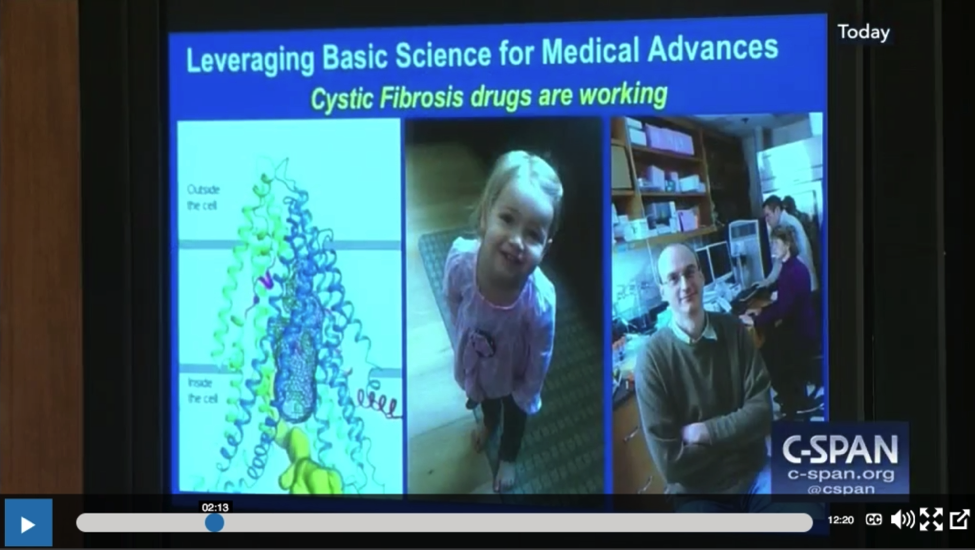 A slide from Dr. Francis S. Collins’ testimony to the Senate Appropriations Subcommittee on Labor, Health, and Human Services on the 2018 NIH budget shows folding in a Cystic Fibrosis (CF) protein, 2-year-old CF patient Avalyn Mahoney, and Dr. Stephen Aller, who is working to decode CF protein misfolding using the latest advances in cryo-EM technology.In his recent Congressional budget briefing, NIH Director Dr. Francis S. Collins extolled the translational science of Dr. Stephen Aller, associate professor, UAB Dept. of Pharmacology and Toxicology, who has integrated a cutting-edge technology (cryo-electron microscopy, or cryo-EM) into his Cystic Fibrosis research on the misfolding of membrane proteins that contributes to the symptoms and shortened life expectancy of those with this disease.
A slide from Dr. Francis S. Collins’ testimony to the Senate Appropriations Subcommittee on Labor, Health, and Human Services on the 2018 NIH budget shows folding in a Cystic Fibrosis (CF) protein, 2-year-old CF patient Avalyn Mahoney, and Dr. Stephen Aller, who is working to decode CF protein misfolding using the latest advances in cryo-EM technology.In his recent Congressional budget briefing, NIH Director Dr. Francis S. Collins extolled the translational science of Dr. Stephen Aller, associate professor, UAB Dept. of Pharmacology and Toxicology, who has integrated a cutting-edge technology (cryo-electron microscopy, or cryo-EM) into his Cystic Fibrosis research on the misfolding of membrane proteins that contributes to the symptoms and shortened life expectancy of those with this disease.
“The goal is to turn CF into a 100% curable disease,” Collins said, “and for that we need the next-generation of scientific talent. Among the early stage investigators tackling this challenge is Stephen Aller, UAB. Trained in both computer science and biology, Stephen plans to fundamentally transform the way we deliver drugs for all kinds of conditions.”
Aller, who holds a PhD in Molecular Biophysics and Biochemistry from Yale, seeks to decipher the mechanism and function of integral membrane proteins in human disease and the means by which drug molecules and antibodies activate and inhibit function. He received a CCTS Drug Discovery Research Award in 2010, followed by an NIH Director’s New Innovator Award in 2011. His research holds great promise not only for producing new CF treatments, but also for reversing multi-drug resistance in cancer.
“The funding support provided by the CCTS allows scientists to take more risks, to think translationally when approaching complex diseases like CF and cancer. Cryo-EM technology could revolutionize research based on three-dimensional crystal structures of relevant mammalian membrane proteins.”
Collins showcased the work of three scientists from across the U.S. to underscore the critical importance of stable well-funded NIH budgets to enable scientific progress in diseases both common and rare. Aller was the first to be mentioned.
A video of Collins’ testimony is available at CSPAN.